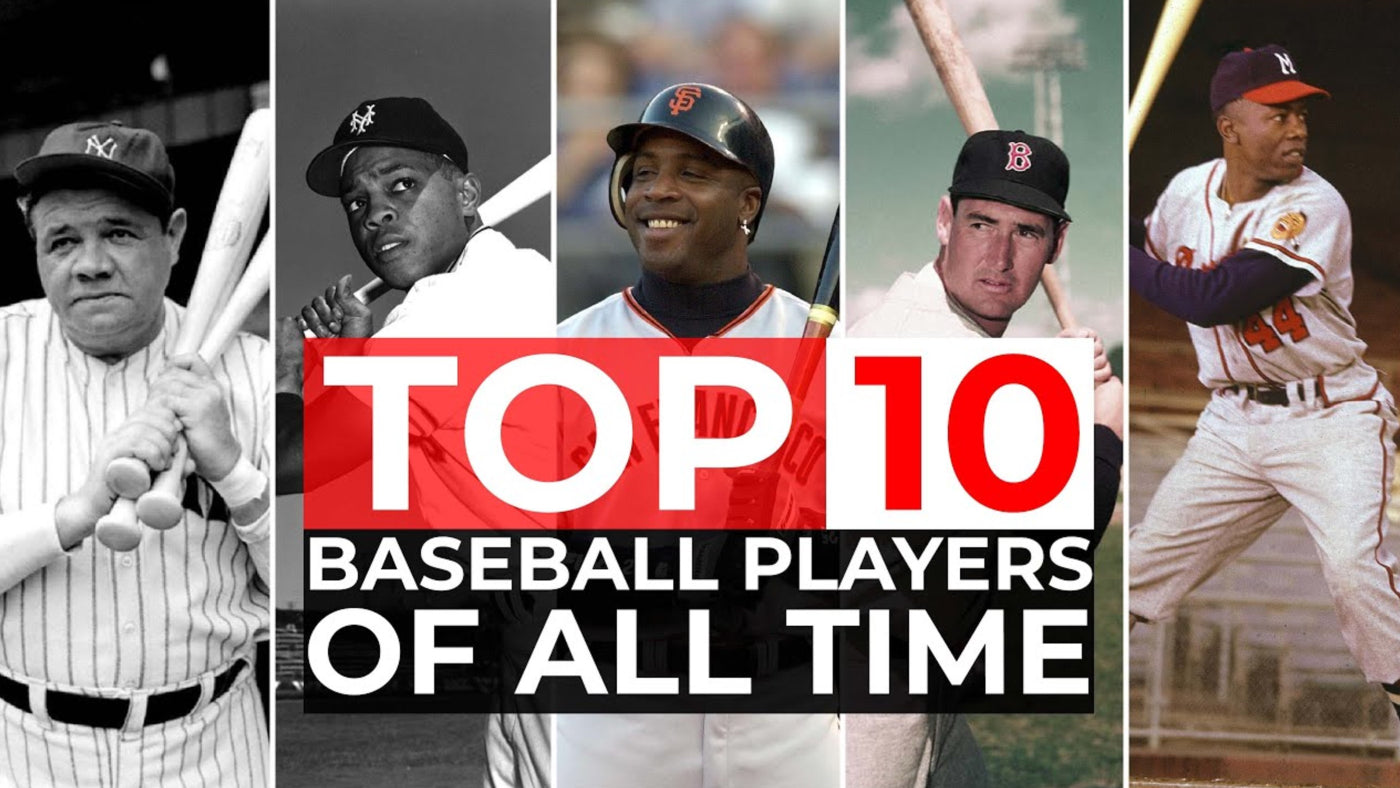Your Cart is Empty
- Mother's Day 🌷
- Gift for Family 🏠❤️
-
Pet
-
Memorial
-
Products
-
Home & Garden
-
Accessories
- Happy Customers ❤️
Who Is The Best Baseball Player Of All Time?
August 21, 2023 11 min read

Baseball, the beloved American pastime, has witnessed the rise of extraordinary athletes who have left an indelible mark on the sport's history. The debate over the greatest baseball players of all time ignites fervent discussions among fans, experts, and historians. In this article, we embark on a journey through baseball's storied past to highlight and celebrate the top 10 players who have redefined the game with their unparalleled skills and lasting legacies.
Contents
1. Roger Clemens: Navigating the Complex Legacy in the World of Baseball 2. Honus Wagner: A Baseball Legend and the Most Valuable Card in History 3. Stan Musial: A Remarkable Player and Exemplary Citizen 4. Ty Cobb: A Complex Legacy and Baseball Greatness 5. Walter Johnson: The Flame-Throwing Pitching Legend 6. Who Hank Aaron: Beyond the Home Run King of Baseball 7. Ted Williams: The Epitome of Pure Hitting Greatness 8. Barry Bonds: Baseball's Enigmatic Legacy of Achievement and Controversy 9. Willie Mays: The Unparalleled All-Around Baseball Legend 10. Babe Ruth: The Unmatched Baseball Legend and Cultural Icon 11. Conclusion
1. Roger Clemens: Navigating the Complex Legacy in the World of Baseball

"Roger Clemens"
Roger Clemens, a renowned figure in the world of baseball, had an impressive career spanning 24 years. His remarkable achievements include securing an impressive seven Cy Young Awards, an esteemed recognition for the best pitcher in either the American or National League. Clemens' legacy also includes a remarkable record of 4,672 strikeouts, standing as the third-highest in history. Notably, in 1986, he achieved the rare distinction of winning a league MVP award as a starting pitcher, with a remarkable 24–4 record, a 2.48 earned run average (ERA), and an impressive 238 strikeouts for the Boston Red Sox.
It's important to note that Clemens achieved all this during a time when numerous opposing batters were suspected of using steroids, leading to an inflation in offensive statistics. However, the shadow of uncertainty looms over his accomplishments, as there are strong indications that Clemens himself might have been involved in steroid use. This perspective sheds light on the context of his era, potentially affecting the perception of his achievements.
Despite his undeniable achievements, personal bias plays a role in placing Clemens within this ranking. While he holds a deserving position here, it's imperative not to let subjective sentiments overshadow his contributions to the sport of baseball. Such complexity highlights the nuanced nature of evaluating players' legacies.
In conclusion, Roger Clemens' career is a blend of extraordinary accomplishments and controversy, revealing the intricate interplay of performance, era-specific challenges, and subjective viewpoints in the realm of baseball.
2. Honus Wagner: A Baseball Legend and the Most Valuable Card in History
Honus Wagner, a prominent figure in baseball history, is widely recognized by contemporary fans as the iconic subject of the rare 1909–11 T206 Wagner baseball card, famously produced by the American Tobacco Company. This card holds the distinction of being the most valuable in the realm of baseball collectibles, often fetching prices exceeding $2 million in auctions. While the scarcity of the card contributes to its exceptional value, it's essential to highlight that its worth is greatly attributed to Wagner's extraordinary stature as one of the finest players to grace the baseball diamond.
Affectionately known as "The Flying Dutchman," a testament to the imaginative nicknames of the past, Wagner's legacy is firmly cemented in his remarkable accomplishments. Throughout his illustrious career, he claimed the National League's batting average title an impressive eight times. Notably, Wagner achieved a stellar batting average of .328, an outstanding feat considering he played during the challenging "dead-ball era," characterized by limited offensive output.
By the time Wagner retired in 1917, his achievements were nothing short of remarkable. He held the distinction of being second in major-league history for hits (3,420), doubles (643), triples (252), and runs batted in (1,732). Remarkably, even today, these impressive figures rank among the top 25 of all time. A testament to his greatness, Wagner's legacy was solidified in 1936 during the inaugural Baseball Hall of Fame balloting. Among thousands of players who had graced the game, he was among the five chosen for this prestigious honor.
In conclusion, Honus Wagner's legacy not only resides in the most valuable baseball card but also in his exceptional contributions to the sport. His achievements, accolades, and enduring impact continue to inspire and captivate both avid baseball enthusiasts and collectors alike.
3. Stan Musial: A Remarkable Player and Exemplary Citizen
Undoubtedly one of the most prominent figures on this list, Stan Musial, affectionately known as "Stan the Man," not only stood as a remarkable player but also exemplified the qualities of an exceptional citizen. This beloved icon of St. Louis established an enduring legacy by dedicating his entire 22-season career to the Cardinals franchise, becoming inseparably intertwined with the city in a manner seldom seen in the realm of athletics.
Stan Musial's impact on the Cardinals was nothing short of extraordinary. Under his leadership, the team secured three World Series titles (1942, 1944, and 1946), a feat that stands as a testament to his prowess both as a player and as a guiding force. His on-field achievements were met with recognition, as he earned three coveted MVP awards (1943, 1946, and 1948), a tribute to his consistent excellence. Musial's incredible talent is evident in his lifetime batting average of .331, a testament to his exceptional hitting abilities.
A true testament to his skill and discerning eye, Musial's highest strikeout tally in a single season was a mere 46, achieved at the age of 41 while actively contributing as an outfielder for the Cardinals. Even at this stage of his career, he maintained a remarkable batting average of .330 for that year. Such a feat underscores his remarkable ability to read the game and make sound decisions at the plate. Musial's consistency in hitting was so impressive that opponents often found themselves resigned to their fate when facing him. Pitcher Carl Erskine aptly captured this sentiment: 'I've had pretty good success with Stan by throwing him my best pitch and backing up third.'
4. Ty Cobb: A Complex Legacy and Baseball Greatness
The transition from Stan Musial to Ty Cobb on this list marks one of the most significant shifts in human character and behavior. If Musial represented the embodiment of virtue, Ty Cobb emerged as a stark contrast—a figure akin to an antagonistic troll beneath the bridge, hurling boulders at unsuspecting passersby. A notorious racist and unrepentant provocateur, Cobb's actions ranged from sharpening his cleats to inflict maximum harm on opponents during slides, to engaging in fights with fans in the stands. However, amid this controversial persona, Cobb's undeniable talent as a baseball player is worthy of recognition, as he boasts the highest lifetime batting average in major-league history (.366).
While Cobb's off-field behavior remains a dark chapter, his contributions on the field were unparalleled. Dominating the American League (AL) for 24 years, he secured the batting average title an astonishing 12 times—an achievement that highlights his exceptional hitting prowess. Not confined to being a mere singles hitter, Cobb demonstrated his power by leading the AL in slugging percentage on eight occasions.
Cobb's hitting achievements are truly remarkable. He achieved a batting average over .400 in three seasons—1911 (.420), 1912 (.409), and 1922 (.401)—a feat that underlines his consistency and skill at the plate. His legacy extended beyond batting averages, as he retired in 1928 with records for hits (4,189), runs scored (2,246), and stolen bases (892), all of which held as benchmarks until the late 20th or early 21st centuries.
5. Walter Johnson: The Flame-Throwing Pitching Legend
Walter Johnson, a baseball titan renowned for his blazing fastball and mastery of pitching, left an indelible mark on the sport, defining an era of dominant pitching. With a legacy spanning decades, Johnson's remarkable talent propelled him to lead the American League (AL) in strikeouts an astounding 12 times during his illustrious 21-year career. As an unwavering member of the Washington Senators, he earned the moniker "Big Train" and solidified his place in history with a record that will likely stand the test of time—110 career complete-game shutouts, the most in major-league history.
Johnson's pitching prowess reached its zenith in 1913 when he achieved remarkable statistics. With a dazzling 1.14 earned run average (ERA) and an astonishingly low 0.78 walks and hits per inning pitched (WHIP), he clinched the Chalmers Award—an accolade equivalent to today's MVP honor. Notably, Johnson's impact extended beyond individual recognition. In 1924, he secured his second MVP award while leading the Senators to their inaugural World Series championship, cementing his legacy as both an exceptional individual player and a driving force behind team success.
With a career record of 3,509 strikeouts, Johnson held a record that endured for 56 years. Additionally, his impressive tally of 417 wins remains second only to Cy Young's legendary 511. Johnson's influence on the game is immeasurable, as his performance and records continue to stand as testaments to his enduring impact on the realm of baseball.
6. Who Hank Aaron: Beyond the Home Run King of Baseball
Hank Aaron, widely recognized as the Home Run King for an entire generation, is often lauded primarily for his extraordinary power hitting prowess—a reputation that solidifies his place among the greatest power hitters in baseball history. Yet, the narrative surrounding Aaron's legacy transcends his impressive 755 career home runs (a record held for an impressive 33 years), revealing the depth of his impact as "Hammerin' Hank."
While his record-breaking home runs stand as remarkable achievements, they represent only a fraction of Aaron's unparalleled accomplishments. His all-time high of 2,297 runs batted in and an astounding 6,856 total bases underscore his legendary power. However, Aaron's talents extended far beyond raw power, as evidenced by his commendable career batting average of .305 and his three Gold Glove awards for outstanding outfield play.
Aaron's consistency on the field was a defining trait. An exceptional player, he earned a remarkable 21 consecutive selections to the All-Star Game, an indicator of his enduring excellence. Notably, he achieved the remarkable feat of hitting at least 30 home runs in an impressive 15 seasons, further solidifying his reputation as a consistent offensive force.
In addition to his record-breaking feats, Aaron concluded his illustrious career in 1976 with the second-highest number of hits (3,771) and runs scored (2,174) in major-league history at that time. These accomplishments bear testament to Aaron's well-rounded skills and his ability to contribute across multiple facets of the game.
7. Ted Williams: The Epitome of Pure Hitting Greatness
For decades, Ted Williams has held the title of "the greatest pure hitter who ever lived," a testament to his extraordinary skills at the plate. With a lifetime on-base percentage of .482—the highest in history—Williams' impact on baseball is immeasurable. His prowess is evident not only in his remarkable statistics but also in his enduring legacy among the top 20 players in runs scored, home runs, runs batted in, and walks, despite missing nearly five prime seasons due to military service. Affectionately known as "The Splendid Splinter," Williams' reputation is further amplified by his distinct nickname, emblematic of his remarkable abilities.
Williams was celebrated for his uncanny eye at the plate, which contributed to his legendary .400 batting average in 1941, marking the last time a major-league season achieved this milestone (.406). Beyond this remarkable feat, the Boston Red Sox icon's achievements encompass leading the American League (AL) in batting average six times, slugging percentage nine times, and on-base percentage 12 times during his illustrious 19-year career.
Williams' excellence extended beyond baseball. He was hailed as both the best fisherman and the best fighter pilot, showcasing his multi-faceted talents beyond the diamond. Despite these accolades, or perhaps due to them, Williams maintained a complex and sometimes challenging relationship with the public. Notoriously prickly, his interactions with fans were marked by a certain distance. Author John Updike eloquently captured this sentiment when Williams declined a curtain call after hitting a home run in his final career at-bat, stating, "Gods do not answer letters."
8. Barry Bonds: Baseball's Enigmatic Legacy of Achievement and Controversy

"Barry Bonds”
Barry Bonds, occupying the third spot on this list, is a figure often viewed through a complex lens. While his reputation includes elements of cantankerousness and suspicion of steroid use, his impact on baseball is undeniable. Bonds is emblematic of the steroid era's challenges, yet his innate talent and achievements demand recognition.
Bonds' reputation as a poster boy for the steroid era is intertwined with debates about legitimacy. Despite this, his prior status as a Hall of Famer remained unquestionable before the alleged steroid use. Furthermore, the undeniable fact remains that steroids couldn't have influenced his exceptional eye-hand coordination, a skill that propelled him to an unparalleled 2,558 career walks and an astonishing .444 lifetime on-base percentage.
The enigma of steroids lies in their nebulous impact on performance, making it impossible to definitively assess their influence. Amid this uncertainty, the focus shifts to Bonds' remarkable achievements. His statistical feats are staggering, including an unmatched 762 home runs—featuring a single-season record 73 in 2001—a record seven career MVP awards, and an astounding 688 intentional walks. The latter figure, more than double that of the player with the second-most intentional walks, serves as a testament to the fear Bonds instilled in opposing pitchers.
9. Willie Mays: The Unparalleled All-Around Baseball Legend
Unlike Bonds, who requires nuanced justification, Willie Mays's position on this list needs no mental gymnastics. Mays's extraordinary contributions on and off the field solidify his remarkable legacy. The grandeur of Mays's achievements is evident not only in his impressive offensive numbers—such as 3,283 hits, 660 home runs, and 1,903 runs batted in—but also in his remarkable prowess as an outfielder, resulting in a remarkable string of 12 consecutive Gold Glove Awards (1957–68). This exceptional blend of talents earned him recognition as arguably the greatest all-around player in the history of the game.
A defining moment in baseball history emerged from Mays's exceptional defensive skills. His over-the-shoulder catch at the warning track during the eighth inning of a tied 1954 World Series game remains an iconic moment that secured victory for the New York Giants and eventually led to their championship title. This feat accentuates Mays's impact on both individual games and the broader history of the sport.
While Mays claimed only one championship in his career, his overall achievements shine brightly. The lack of extensive team success does nothing to diminish the legacy of the 20-time All-Star and two-time MVP (in 1954 and 1965). Willie Mays's influence transcends mere statistics; he is a symbol of baseball excellence and a paragon of all-around athleticism.
10. Babe Ruth: The Unmatched Baseball Legend and Cultural Icon
In the realm of baseball history, there are figures that transcend simple qualifiers, and Babe Ruth stands as a quintessential example. While he played during a period marked by limited talent pools and a distinct era of the sport, his historic talent elevates him beyond these considerations. His impact was so seismic that it marked the end of the dead-ball era, ushering in a new era of the game.
Babe Ruth's entry into the major leagues in 1914 heralded a paradigm shift. The record for home runs in a season was a mere 27, yet Ruth rapidly altered this landscape. Within seven years, he more than doubled the record with 59 home runs, eventually reaching an astounding 60 dingers in 1927. His dominance in home runs led him to claim the title 12 times in the American League.
Ruth's prodigious power hitting led to a remarkable .690 career slugging percentage, which remains unmatched to this day. The gap between his record and second place is indicative of his unparalleled prowess. Additionally, Ruth's versatility was evident in his early years as a great pitcher. In 1921, he led the American League with a 1.75 earned run average (ERA) and showcased his pitching prowess in World Series contests.
Beyond his on-field accomplishments, Ruth's charismatic personality and larger-than-life presence transformed him into the first transcendent American sports superstar. His legendary tenure with the New York Yankees in the 1920s not only elevated the team's prominence but also played a pivotal role in shaping baseball's enduring place in the national consciousness.
In conclusion, Babe Ruth's legacy extends beyond his status as the greatest baseball player of all time. His unrivaled impact on the sport and his transcendent cultural influence elevate him to a level of unparalleled significance, making him not only a historic figure within baseball but also a symbol of the broader American experience.
11. Conclusion
The list of the10 greatest baseball players of all time showcases the diverse talents, contributions, and impact that these athletes have had on the sport. From the power-hitting prowess of Babe Ruth to the cultural significance of Jackie Robinson, each player has left an indelible mark on the game's history. As baseball continues to evolve, these legends serve as a testament to the enduring allure and rich legacy of America's favorite pastime.
Related products for Baseball Lovers:

Hazel Edison
Hazel Edison's mission as a content marketer and social media manager is to help businesses connect with their target audience through engaging and informative content. With a deep understanding of the power of digital media, Hazel is committed to helping the brand build its online presence and drive results.
Related articles in Baseball

What Is a Quality Start in Baseball? Understanding the Pitching Metric
August 27, 2023 7 min read
Read More


